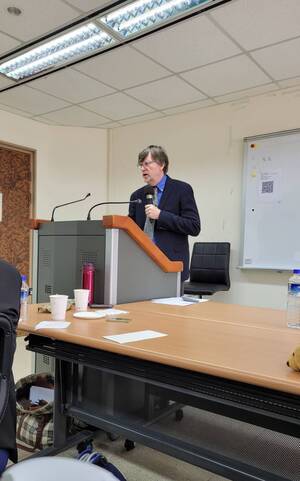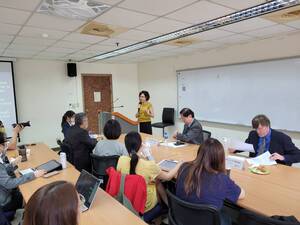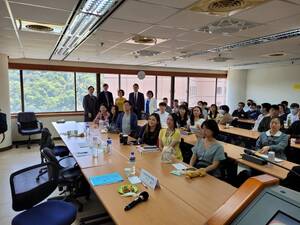Date :
2021-04-23
Department :
International Master's Program in International Studies
【Article by IMPIS】
International Master's Program in International Studies (IMPIS) and Taiwan Foundation for Democracy invited Professor William A. Callahan from The London School of Economics and Political Science to give a speech in the course of “China foreign policy” on April 21st. The topic was: Visualizing Community: Nationalism, Democracy, and Civic Education in Taiwan and the PRC. The lecture has attracted many faculties and students all over the university to attend. Professor Chung-Chian Teng, director of IMPIS, was invited to be the moderator, and Professor Chiung-Chiu Huang, the professor from Graduate Institute of East Asian Studies was the discussant.
In the beginning, Professor Teng introduced Professor Callahan to the attendants of the speech. Professor Callahan mainly shared about how elementary school education, especially the images in the textbooks reflected our expectations for good citizenship in every period; meanwhile, it showed how Taiwan had regarded itself, cross-strait relations and the international community. Professor Callahan took Taiwan’s social science textbook as an example, from the 1960s to 1990s, we could easily observe that the content changed from celebrating “Three Principles of the People” and containing communism to emphasis on teaching our younger generation to get along with aboriginal people and people from all around the world. The transformation of the axis of education reflected how Taiwan regarded itself own status.
Another salient example is how the content of civic and ethics courses developed as time went by. In the past, Taiwanese were depicted as the people with “yellow skin and black hair”. Nowadays, immigrants from Southeast Asia and aboriginals are considered components of the Taiwanese community. On the other hand, Chinese textbooks used to value socialist internationalism; however, they shed more lights on ethnic-nationalism with images of Han Chinese on their textbooks now. It has shown a diametrical direction of development comparing with Taiwan.
In conclusion, Professor Callahan reiterated that images in textbooks reflected the transformation of democratic values and the construction of democratic communities. In the process of development, we can understand that Taiwan’s elementary school education is heading toward constructing an inclusive society, which contributed significantly to the democratic regime we have right now.
Professor Huang complimented the value of professor Callahan’s research in the first place, which has provided a brand-new approach for us to understand the democratic paradigm and community construction between Taiwan and China. Professor Huang pointed out that textbooks in China usually depicted foreigners as Africans, while Taiwanese textbooks would portray them as South Asian people. This difference showed the distinctive priority on foreign policy between the two states. In the last section, students launched their relevant questions to the content, Professor Callahan answered very thoroughly as well. The speech ended in heated discussion with academic connotation, in which everyone was certain that they have gained a lot and looked forward to attending another speech from Professor Callahan in the future.




